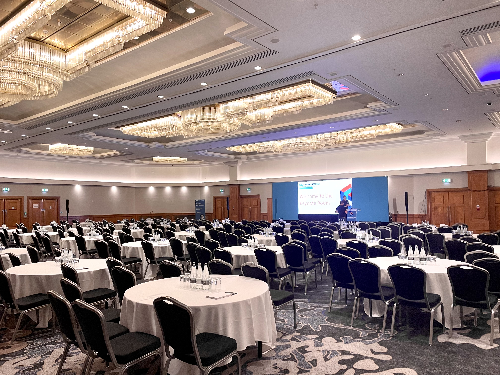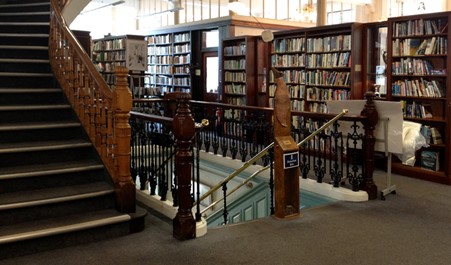The tour of the House of Commons Library took place on 4th April at lunchtime and was conducted by Amina Gual with thanks to Valerie Bearne for organising.
The library looks over the Thames and is based in an interesting part of Parliament on the Principal floor which is a prime spot. There has been a royal palace on the site since the 11th Century. The current House of Commons Library was completed 1852 in the 19th Century on the site of the old palace of Westminster which was burnt down in 1834. It is 170 years old but there was always a royal palace on the site.
Parliament didn’t always have a library, the library originated from early 19th century with the first librarian Benjamin Spiller. The library was originally in St Stephens’s Hall and following the fire a design a competition was run for a new palace of Westminster. Charles Barry won the bid and was the successful architect. The Interior of the library is very gothic with the fabric of the building laid out to how the architect and designer, Augustus Pugin, envisaged.
Starting with the Reference Room there are some interesting artefacts including bolt clippers used to cut chains off from suffragettes who attached themselves to the buildings. This is part of the Women in Parliament display in the room.
Looking back to 100 years at photos, the Commons library is not dissimilar from today’s library. The library is classed as a heritage site meaning much of the fabric and fittings cannot be changed. All furniture tables and chairs are in keeping with the original design with the ceiling demonstrating intricacies of design in addition to the chandeliers and carpets.
The Reference Room was not part of the original library in 1852. There are now an additional three rooms. Space is at a premium nowadays in Parliament. The Reference Room is a small reference library with usual things one would expect to find including photocopiers, workspace and books. Old bound volumes of minutes of Parliament predating digital copies exist. Originally at the time of the British Empire this room was a Map room with a large globe in the centre. Maps at this time were incredibly important. Some members come in and work at the tables but primarily staff. The room hosts occasional functions. The display of Women’s history is not originally part of the library.
There are galleries which were added in the 19th century to the original design and more galleries were added in the 1950s.
The Oriel Room derived its name from the Oriel window which is a large bay window in the room, quite grand and suspended mid-way. The window overlooks the Thames and House of Commons terrace. This room is a main section room for the Commons Library and is staffed between team of 10-12 answering personal enquiries. The majority of the work is undertaken online and deals with enquiries from Members of Parliament, their staff and house staff by e-mail, occasionally by telephone. Other teams are based in the Outbuildings near St James’ park. There are 8 Specialist teams – specialist researchers on policy matters, stats etc.
Some of the main work undertaken is to prepare briefing papers to look at topics prior to debate – E.g., Post Office Horizon System Bill. The documents provide a background and look at the bill to inform the debate. These are impartial and are produced before bills or any piece of major legislation goes into the Commons.
The briefings are not just focussed on Parliament but world affairs such as Ukraine, Gaza etc. These are available to the public and are hosted on the main site which is a one stop shop for all library research.
The library offers a loan service with over 100,000 books in its collection though not all are on site. The collection is a specialist collection and has few fictional works.
Their budget is set by the House and the details are quite complicated and form part of the administrative vote (supply estimates) published as House of Commons papers. Funding is from the “public purse”, so they are accountable for money spent.
The team are Generalists with a good amount of knowledge, however specific knowledge can be provided by the 8 specialist groups which include international affairs and defence, social policy (education, housing), Science and environment, economic and policy section. The team administer and triage their enquiries. If specialist input is required this is then allocated to a particular specialist for the relevant group. Priority is given to enquiries relating to business of the house and debates of the chamber. The team can receive 30,000+ enquiries per year however there is a lot of other work which happens behind the scenes which isn’t captured.
Library teams produce regular mail outs of briefings for the week, of any member of staff or house staff can subscribe to. These mailouts detail what is published for the week. For a back bench debate the team will proactively approach the relevant individuals. The team works closely with the devolved libraries and help answer enquires where possible and have a good relationships with other European Parliaments.
They have a library management system where material is loaned for people to borrow books with a generous loan period, if it’s not renewed and following a process of several stages of overdue notices and if the book is not returned the borrower will replace it although this does not happen very often.
There are other rooms within the library which are used. ‘A’ Room has lots of books and provides IT for members of parliament some of whom have favourite spots. In this room there are special green leather chairs which were originally used by the Speaker and Sergeant at arms when the Commons Chamber was temporarily relocated during the second world war. There is also a ritual old fashioned safe which is still used by the team today.
There is still quite a demand for newspapers and magazines and the team still take in a selection of hard copy daily newspapers both regional and major. There are many online subscriptions free of charge to see these. Hard copy holdings have been reduced with digital services replacing these, saving costs.
The lovely fixtures and fittings (including the shelving and furniture) are set in gothic 19th century with a controlled environment and hasn’t changed. Present are a lovely original metal stationery racks which are silver plated, heavy and are nothing like what exists today. The fireplace which is a very visible part of the room is no longer used. It was interesting to learn about the House of Commons Journals which document minutes of the proceedings in the Chamber which are still used to this very day.
An original set of early House of Commons Journals is held by the Parliamentary Archives. The current set in the Library are re-prints of the early original volumes. The originals were rescued from the fire and the collection includes volumes dating back to 1547. One entry of note was 4th January 1642 recording the time when Charles I entered Parliament with henchmen and was in conflict with Parliament confronting Speaker Lenthall. These journals literally documented minutes of the day’s events and are recorded in a very matter of fact way.
The House of Commons Library is not a Parliamentary archive, however there is a Parliamentary archive team based in the House of Lords who are the official archivists for both Houses. This team is due to be amalgamated with the National Archives in 2024 so their function will move to them.
‘C’ Room is a little quieter than the other rooms and does not provide any IT, however from this room there are some spectacular views of Lambeth Palace and County Hall across the Thames.
‘C’ Room is quite special has engraved panels at the top with dates from 1377 representing the names of all the speakers of the House of Commons dating to the present Speaker Lindsay Hoyle. The names were engraved mid 20th century.
Times the library open tend to be from the very beginning when the House is sitting at 9am to rise of the house (sitting period) and can vary each day. There is a separate night team who covers from 18:00 to closure.
Library staff are subject to general security vetting as are all parliamentary employees.
‘D’ Room is a quiet room not originally part of the House of Commons Library and was the original Speaker’s private library / apartment. This was gifted to House of Commons library in 1966. There is a panel designed to screen the library from what was the Speaker’s accommodation. The room contains many volumes of parliamentary papers and Busts, of which one is of Erskine May, a clerk who became a senior clerk whose name represents the Parliamentary Bible explaining conventions and presence of parliament.
A second Bust is present of Spencer Perceval an early 19th Century Prime minister who was assassinated in parliament on 11th May 1812 by John Bellingham, an individual who had a grievance against the government for his treatment a few years ago previously when he had been imprisoned in Russia for a trading debt.
In the room there was a phone from 1920 which works a little like a telephone intercom and used to communicate between Speaker’s private library and Speaker’s private apartments and different rooms.
There are no particular rules, however the statement of services which states what they can do, ethos and also limitations on services. They won’t undertake translation work and do not support members’ private interests. All the work is to support members in their parliamentary duty.
Overall a very enjoyable tour of the library which overlooks some fantastic views and it is amazing to see the fixtures, furniture and look of the room remaining in place to preserve a key part of history from that period of time with the library still in operation today.
























